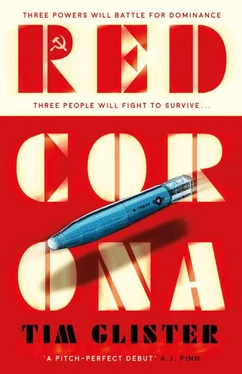His mother and father were content to while away their lives on their large Hertfordshire estate, enjoying the silver spoon that Williams’s father had had the luck to be born sucking on. Williams himself preferred to do something with his. When he was young, he used his money to travel, and his easy charm to make friends all over the world. Then, when it was time for more serious pursuits, he used his name to get into Sandhurst. His great-grandfather had been a brigadier in the early days of the Raj in India, and the army had a long memory.
Knox met Williams in Paris during the sombre yet heady days after its liberation from the Nazis. Williams was five years older than Knox, an officer in the 1st Royal Tank Regiment. He’d landed on Gold Beach during D-Day and had been in France ever since, pushing the Wehrmacht back village by village.
The proprietor of a small bistro on the Île Saint-Louis sat them together one night when they happened to arrive at the restaurant at the same time, both in uniform. Before Knox could point out that they didn’t know each other, Williams had asked the owner, in perfect French, for a good bottle of Cahors wine for them to share.
‘I’ll show you mine and you can show me yours,’ Williams said to Knox as their wine was delivered.
‘Excuse me?’ Knox asked, confused.
Williams unbuttoned his uniform jacket and pulled up his shirt to reveal a large patch of scar tissue that ran up the left side of his torso. ‘Got caught a little too close to an incendiary on a trip to the seaside.’
Knox was momentarily transfixed by the swirls of flesh that stretched up towards his new dining companion’s chest and down towards his hip.
‘I like to think of it as my own, personal Van Gogh. Maybe I should get it painted,’ Williams joked as he tucked his shirt back in.
Knox pulled back the thick lock of hair that he’d started to let fall over his forehead, revealing the wide scar that stuck out from his hairline. ‘Goes all the way back,’ he said.
‘Normandy?’ Williams asked.
Knox shook his head. ‘Afterwards. I was on a patrol outside Rouen, looking for German stragglers. We got word there might be some holed up in the roof of an old manor house. It was late, and everyone was tired, so I volunteered to take a look. They were there, alright. Two young Germans who had been surviving on God knows what for weeks. One of them was too frail to do anything, the other decided to put me through a wall to protect his friend.’
‘What did you do?’
‘Lay half concussed in a pool of my own blood while the rest of my company came to the rescue.’
They shared more war stories over dinner and another two bottles of wine. And for the next week they spent every day together, dining, drinking, and touring the city.
Months later, demobbed and uninterested by the prospect of restoring his family’s pile to its pre-war state (it had, like many country homes, been taken over by the military for the duration of the war), Williams looked up Knox in London.
Knox introduced him to Holland over a long dinner and drinks at the Garrick Club, where Holland was a member. Williams fitted the rarefied surroundings more than Knox ever had, but his irreverence for them still shone through. Holland liked him, and by dessert they were discussing his prospects. Within a week Williams was cleared to join MI5. From that point Knox and Williams trained together, worked together, and spent most of their free time together. Then, after fourteen years of friendship closer than Knox ever thought he’d experience in his life, he got Williams killed.
In 1959, President de Gaulle decided to pay a visit to Prime Minister Macmillan. Freshly elevated to the highest office in France, de Gaulle felt he deserved all the pomp his new title would afford him. It was to be a state visit.
He sailed across the Channel aboard the Surcouf , one of the French navy’s new T 47-class destroyers, passing within ogling distance of the naval shipyards in Plymouth so everyone there could get an eyeful of the latest symbol of France’s post-war resurgence, before arriving in Southampton.
Of course, some people wanted a closer look at the destroyer, and a plan was hatched between MI5, MI6, and Naval Intelligence to do just that. There was a rumour that the Surcouf had a new underwater guidance and torpedo detection system installed on the underside of its forward hull, and the navy wanted to know if it really existed before they made overtures about an official exchange of information.
Knox was put in charge of the mission, and Williams, who had spent six months training with military divers for exactly this kind of operation, led the dive team.
The night that de Gaulle was in London being wined and dined at Buckingham Palace, the clouds over Southampton were thick and the harbour water dead calm – perfect conditions for a clandestine dive.
Confidence was high as Williams and his team slipped into the sea outside the harbour and made their way towards the destroyer. But when all the divers but Williams surfaced on time, Knox became concerned. When he hadn’t appeared after twenty minutes, concern turned into worry. Williams had enough air in his tank to last an hour, but that window came and went with no sign of him. This was the one outcome Knox hadn’t prepared for. He ordered people to comb both sides of the Southampton estuary all the way up to the Solent. They found nothing. He wanted to send every diver back into the water, requisition boats to start dredging the harbour. But by then it was morning, and doing either would make it obvious to anyone within fifty miles that Britain had been flagrantly spying on an ally in the middle of a state visit. So, nothing was done.
The next day Williams was quietly listed as missing in action, and the operation, which had only proved that the guidance and detection system was just a rumour after all, was officially forgotten.
Without his closest friend, and racked with guilt over his death, Knox started to unravel. While his colleagues may have only seen his usual professional mask harden, Holland could see cracks starting to show in it. He arranged for a short leave of absence after the painful debriefing at which Knox was absolved of any responsibility for Williams’s unfortunate but accidental death. And when the leave ran out and Knox didn’t return to Leconfield House, Holland went looking for him.
He found him in the Gresham Arms, unshaven, unkempt, and cradling his fifth pint of the day. Holland sat down opposite Knox, lifted the pint glass from his hands, and told him that this wallowing wasn’t doing anything to respect Williams’s memory and that he needed to pull himself together and get on with his job.
The next day Knox was back at headquarters, and the following week Sarah Holland arranged a small, private memorial for Williams.
‘He’ll be with you for the rest of your life,’ she’d told Knox when he’d said he wasn’t ready to say goodbye to his best friend. ‘You need to carry more than his death.’
Knox went back to work, but without Williams it felt like there was an invisible wall around him, an impenetrable distance between him and everyone else that only Holland, sometimes, could cross.
Since then Knox had stepped away from running all but the most important active operations – like Calder Hall – and dedicated more and more time to sifting through MI5’s past. It had given him a focus, a purpose, but it had also widened the gulf between him and everyone except the few people he was closest to.
Now, Knox felt almost as adrift as he had after Williams’s death. But this time Holland wasn’t here to help him through it.
He had no idea what he should do next. The problem was a lack of concrete, tangible evidence to guide him. He hadn’t found anything to suggest Bianchi and Moretti were more than the couple of chancers he’d originally dismissed them as. There was nothing that connected them to the Russians. And nothing to link them back to Manning, either. So, why was Manning so interested in them? Or Knox, for that matter? Why go to the trouble of kicking him out only to bring him back in? Why not leave him out in the cold where he couldn’t cause him any more trouble?
Читать дальше












